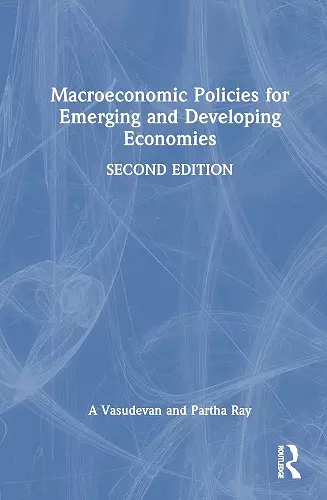Macroeconomic Policies for Emerging and Developing Economies
Partha Ray author A Vasudevan author
Format:Hardback
Publisher:Taylor & Francis Ltd
Published:1st Dec '23
Currently unavailable, and unfortunately no date known when it will be back
This hardback is available in another edition too:
- Paperback£39.99(9781032622774)

This book examines the relevance of the concepts and hypotheses of macroeconomics in the contemporary world. It discusses the current debates on theory and practices of macroeconomic policies with a focus on developing economies emerging from the impact of Covid-19 pandemic.
The volume advocates for a symbiotic relationship between macroeconomic policies and development strategies. It analyses several issues related to macroeconomic tools, which include openness, capital flows, exchange rate and financial strategies. It underscores the need to design a development strategy that accounts for the economic context of the countries concerned. Further, the book advocates for well-regulated macrofinancial policies promoting sustainable growth. It also provides recommendations to policy makers on formulating a sound and inclusive macroeconomic policy essential for financial stability.
This book will be of interest to students and researchers of macroeconomics, public administration, development studies, management and policymaking. It will also be useful to economists, policymakers and journalists working on emerging and developing economies.
In this book, two highly eminent scholars and former central bankers, Dr A. Vasudevan and Dr Partha Ray, with very rich and prolonged experience in the analysis and formulation of the various dimensions of macroeconomic policy in India and elsewhere, attempt a truly credible and readable narrative of fiscal, monetary and exchange rate policies for financial stability in emerging developing economies. The specific context for their analysis is the Global Financial Crisis of 2007–2008, and its aftermath, and they paid particular attention to the development strategy, political economy and institutions of the economy in question. The authors opine that in spite of voluminous literature on the subject, the profession's understanding of the solution to such crisis is quite incomplete. The book is a veritable gold mine not only for postgraduate students and teachers of macroeconomics but also for policy makers and analysts. The unique feature of combining the analysis of economic and financial aspects, without resort to ‘mathi-ness’ and avoidance of jargon, entitles the two authors for handsome compliments of the economics profession.
K. L. Krishna, Chairperson, Madras Institute of Development Studies, and Former Professor and Director, Delhi School of Economics, India
The crumbling of the modern macroeconomics consensus after the global financial crisis has opened up space for creative rethinking about macroeconomic policy. This book by A. Vasudevan and Partha Ray is a part of that process. It deserves to be read by all those who are interested in the craft of policymaking—professional economists, policy makers, economics students and journalists. Macroeconomic Policies for Emerging and Developing Economies has a rare combination of scholarly depth with the contextual nuances of policymaking. This book not only deals with the challenges of fiscal, monetary, exchange rate and financial stability policies but also re-establishes their forgotten link to national development strategies. It also transcends the usual binary distinction between positive economics and normative economics—and embraces what John Neville Keynes called the art of economics. A must read..
Niranjan Rajadhyaksha,Executive Editor, The Mint, India
This unusual and stylistically interesting book is rooted not only in the authors’ rich global experience but also in reality. It stays true to their aim ‘essentially to lay bare the processes, institutions and analytical underpinnings of macroeconomic policies’. But it goes well beyond that target. They view macroeconomics as much more than the theoretical constructs of academics or bureaucrats who serve to formulate economic policy in an increasingly turbulent world. Their inspiration comes from the Bengali addas or ‘salons’ that produce lively exchanges and penetrating commentary to arrive at a better understanding of issues under debate. Against this epistemic background, they relate efforts of rapidly emerging economies, such as India, to face up to the economic challenges of today's interconnected world. But the economy is more than economics. It also encompasses finance and behavioural sciences and takes into account people and their unfathomable behaviour, as well as the politicians’ search for measures that would improve general welfare and ensure the longevity of political leaders themselves. The real world experience of the authors makes this a valuable addition to the literature. Let us hope political leaders will make the time to read and profit from its trenchant analyses.
ShujaNawaz,Former Editor, Finance & Development quarterly of the IMF and the World Bank, and Member, Advisory Board, World Bank Research Observer; Distinguished Fellow, South Asia Center, Atlantic Council, Washington DC
ISBN: 9781032508184
Dimensions: unknown
Weight: 453g
168 pages
2nd edition